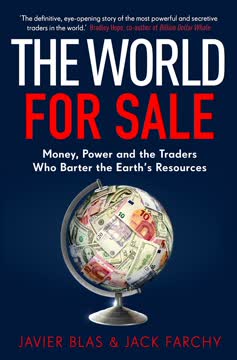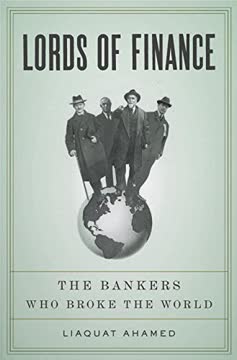Key Takeaways
1. Central bankers shaped the global economy in the 1920s
For the world's most important central banker to have a nervous breakdown as the global economy sank yet deeper into the second year of an unprecedented depression was truly unfortunate.
The power of central bankers. In the 1920s, a small group of central bankers wielded enormous influence over the global economy. Key figures included:
- Montagu Norman of the Bank of England
- Benjamin Strong of the Federal Reserve Bank of New York
- Hjalmar Schacht of the Reichsbank
- Émile Moreau of the Banque de France
These men made crucial decisions about interest rates, currency values, and international loans that shaped the economic landscape. Their personal relationships, rivalries, and ideologies often influenced policy choices with far-reaching consequences.
Challenges faced. The central bankers grappled with:
- Rebuilding the international financial system after World War I
- Managing the return to the gold standard
- Dealing with war debts and reparations
- Responding to economic crises and market speculation
2. The gold standard's return created economic imbalances
"I will make you the golden Chancellor."
The gold standard dilemma. The return to the gold standard in the 1920s was seen as crucial for economic stability, but it created significant problems:
- Britain rejoined at an overvalued rate, making its exports uncompetitive
- France set its franc at an undervalued rate, giving it an unfair advantage
- The United States accumulated excessive gold reserves, creating global imbalances
These disparities led to deflationary pressures in some countries and contributed to economic instability. The rigid rules of the gold standard limited countries' ability to respond to economic challenges, ultimately exacerbating the Great Depression.
Attempts at management. Central bankers tried to manage these imbalances through:
- Interest rate adjustments
- International loans
- Currency interventions
- Informal cooperation agreements
3. Reparations and war debts strained international relations
"Les Boches paieront" "The Krauts will pay"—was the refrain.
The burden of war debts. The aftermath of World War I left a complex web of debts and reparations that strained international relations:
- Germany owed massive reparations to the Allies
- European Allies owed war debts to the United States
- The U.S. insisted on repayment while Europeans sought debt forgiveness
This situation created resentment and economic instability, particularly in Germany. The Dawes Plan of 1924 attempted to address the issue by restructuring German reparations, but it ultimately failed to solve the underlying problems.
Consequences:
- Fueled economic nationalism
- Contributed to political instability in Germany
- Hindered economic recovery in Europe
- Strained diplomatic relations between allies
4. Monetary policies fueled speculation and market instability
Strong had very deliberately not invited any members of the Federal Reserve Board to the Mills house.
The Fed's fateful decision. In 1927, Benjamin Strong of the New York Fed orchestrated a decision to lower U.S. interest rates to help Britain maintain the gold standard. This decision had unintended consequences:
- Fueled speculation in the U.S. stock market
- Contributed to the formation of a market bubble
- Created tensions within the Federal Reserve System
The policy highlighted the challenges of balancing domestic and international economic concerns, as well as the dangers of opaque decision-making in central banking.
Consequences of easy money:
- Rapid rise in stock prices
- Increase in margin lending
- Growing concerns about market stability
- Criticism of the Fed's focus on international issues
5. Personal rivalries influenced global financial decisions
Norman dominated the proceedings, seated at one end of the conference room in a fan-backed oriental chair.
The impact of relationships. The personal dynamics between central bankers significantly influenced policy decisions:
- Norman and Strong's close friendship shaped Anglo-American cooperation
- Norman's rivalry with Moreau hindered Franco-British coordination
- Schacht's confrontational style created tensions with other bankers and politicians
These relationships often superseded formal institutional structures, leading to both productive collaborations and damaging conflicts.
Key relationships:
- Norman-Strong: Close allies
- Norman-Moreau: Antagonistic
- Schacht-Norman: Initially cooperative, later strained
- Strong-Moreau: Increasingly sympathetic
6. The U.S. stock market boom led to the Great Depression
In August, following the Fed cut in rates, the market immediately took off.
The buildup to the crash. The U.S. stock market experienced a dramatic boom in the late 1920s, fueled by:
- Easy credit policies
- Technological optimism
- Widespread speculation
The Federal Reserve's attempts to curb speculation through interest rate hikes in 1928-29 came too late and were too aggressive, contributing to the market crash and subsequent economic contraction.
Key factors in the boom:
- Low interest rates
- Margin lending
- New industries (e.g., automobiles, radio)
- "New era" thinking
- Limited regulation of financial markets
7. Central bank independence was crucial yet challenged
Though the governor and deputy governors by this time tended to be drawn from the ranks of the higher civil service, they were still ultimately responsible to the twelve-man Council of Regents.
The importance of independence. Central bank independence was seen as crucial for maintaining monetary stability, but it was often challenged:
- Political pressures to finance government deficits
- Conflicts between national and international economic objectives
- Disagreements within central banks about policy direction
The structure and governance of central banks varied, influencing their ability to resist external pressures and make independent decisions.
Challenges to independence:
- Government interference
- Public criticism
- Internal disagreements
- Conflicting mandates (e.g., domestic vs. international stability)
8. Economic nationalism hindered international cooperation
I explained to the Prime Minister that since England was the first European country to recover a stable and reliable currency after the war, it had used this advantage to build the foundation for a veritable financial domination of Europe.
The rise of economic nationalism. Despite attempts at international cooperation, economic nationalism increasingly shaped policy decisions:
- Countries prioritized domestic economic interests over global stability
- Competitive devaluations and protectionist measures became common
- Efforts to maintain national prestige influenced monetary policy
This trend undermined the fragile international financial system and contributed to the severity of the Great Depression.
Manifestations of economic nationalism:
- Currency manipulation
- Trade barriers
- Competition for financial influence in smaller countries
- Reluctance to coordinate policies internationally
9. Hyperinflation in Germany had lasting consequences
By November 1923, Germany experienced the single greatest destruction of monetary value in human history.
The trauma of hyperinflation. The hyperinflation in Germany in 1923 had profound and lasting effects:
- Destroyed savings and upended the social order
- Created deep distrust of paper money and government financial management
- Influenced German economic policy for decades
- Contributed to political instability and the rise of extremism
The experience shaped German attitudes towards monetary policy and influenced the country's approach to European economic integration in later decades.
Consequences of hyperinflation:
- Wiped out middle-class savings
- Undermined faith in democratic institutions
- Created a strong aversion to inflation in German culture
- Influenced the Bundesbank's later focus on price stability
Last updated:
FAQ
What's Lords of Finance: The Bankers Who Broke the World about?
- Focus on Central Bankers: The book centers on four influential central bankers—Montagu Norman, Benjamin Strong, Hjalmar Schacht, and Émile Moreau—who shaped the global financial landscape during the interwar period.
- Economic Policies and Consequences: It examines how their decisions regarding the gold standard and international finance contributed to the economic collapse of the 1930s.
- Historical Context: Set against the backdrop of World War I reparations and the rise of fascism, the narrative explores the interconnectedness of global economies.
Why should I read Lords of Finance by Liaquat Ahamed?
- Insightful Historical Analysis: The book provides a deep dive into the economic decisions that shaped modern financial systems, essential for understanding current economic policies.
- Lessons from the Past: It offers valuable lessons on leadership and sound economic policy, particularly during crises, which remain relevant today.
- Engaging Narrative: Ahamed combines thorough research with a compelling narrative style, making complex economic concepts accessible and engaging for readers.
What are the key takeaways of Lords of Finance?
- Failures of Central Bankers: The book emphasizes that the central bankers' adherence to the gold standard and their failure to act decisively during crises were significant factors in the Great Depression.
- Importance of Monetary Policy: It highlights how monetary policy can either stabilize or destabilize economies, depending on the decisions made by financial leaders.
- Interconnectedness of Global Economies: Ahamed illustrates how the financial decisions of one country can have far-reaching effects on others, underscoring the need for international cooperation in economic policy.
What are the best quotes from Lords of Finance and what do they mean?
- “If you can’t say anything nice, don’t say anything at all.”: Reflects the cautious approach central bankers must take during financial crises, balancing honesty with the need to maintain public confidence.
- “Let me issue and control a nation’s money and I care not who writes the laws.”: Highlights the immense power that comes with controlling a nation’s currency, underscoring the influence of central bankers.
- “Capitalism was saved in eight days.”: Refers to the swift actions taken by Roosevelt's administration to stabilize the banking system, illustrating the potential for rapid recovery when decisive measures are implemented.
How did World War I affect global finance according to Lords of Finance?
- Destruction of Financial Systems: The war led to the collapse of the pre-war financial order, with countries like Britain, France, and Germany facing massive debts and economic instability.
- Shift in Economic Power: The United States emerged as the world's leading economic power, with its gold reserves doubling and becoming the primary lender to Europe.
- Inflation and Currency Issues: Countries resorted to printing money to finance the war, leading to hyperinflation in Germany and other nations, which destabilized their economies post-war.
What role did the gold standard play in the events described in Lords of Finance?
- Economic Constraints: The gold standard limited the ability of central banks to respond to economic crises, as they were bound to maintain fixed exchange rates and gold reserves.
- Deflationary Pressures: Adherence to the gold standard during the Great Depression exacerbated deflation, leading to widespread economic hardship and unemployment.
- Global Impact: The rigidities of the gold standard created a domino effect, where the economic troubles of one country quickly spread to others, highlighting the interconnectedness of global finance.
How did the actions of central bankers lead to the Great Depression?
- Inadequate Responses: Central bankers failed to act as lenders of last resort during banking panics, allowing confidence to erode and leading to widespread bank failures.
- Misaligned Policies: Their commitment to the gold standard and deflationary policies restricted monetary supply, worsening economic conditions and prolonging the downturn.
- International Coordination Failures: The lack of cooperation among central banks during crises led to a fragmented response, exacerbating the global economic collapse.
What were the consequences of the reparations imposed on Germany?
- Economic Instability: The reparations created significant economic strain on Germany, leading to hyperinflation and social unrest, as the country struggled to meet its financial obligations.
- Political Fallout: The burden of reparations contributed to political instability in Germany, fostering resentment and extremism, which would later facilitate the rise of the Nazi Party.
- Long-term Impact on Europe: The reparations issue poisoned relations between Germany and the Allies, creating a cycle of debt and economic hardship that would have lasting effects on European stability.
How did the Dawes Plan impact the global economy according to Lords of Finance?
- Stabilization of Germany: The Dawes Plan was designed to stabilize the German economy by restructuring reparations payments and providing loans from the U.S., leading to a temporary economic recovery.
- International Cooperation: The plan exemplified a moment of international cooperation among the major powers to address the economic fallout from World War I.
- Short-term Success, Long-term Issues: While initially successful, the plan created a dependency on foreign loans and did not address the underlying issues of reparations, contributing to Germany's economic vulnerability.
How did the Great Depression affect international relations, according to Lords of Finance?
- Economic Tensions: The economic turmoil created by the Great Depression strained international relations, as countries turned inward and adopted protectionist policies.
- Shift in Power Dynamics: The crisis altered the balance of power in international finance, with the United States emerging as a dominant economic force while European countries struggled.
- Long-term Consequences: The failures of the interwar financial system and the inability to cooperate on economic issues contributed to the conditions that led to World War II.
How does Lords of Finance relate to modern economic issues?
- Lessons on Monetary Policy: The book serves as a cautionary tale about the dangers of rigid monetary policies and the importance of flexibility in economic management.
- Global Financial Interdependence: It underscores the interconnectedness of global economies, a concept that remains relevant in today's increasingly globalized financial landscape.
- Crisis Management: The historical analysis provides insights into how policymakers can effectively respond to financial crises, emphasizing the need for decisive action and international cooperation.
What is the significance of the Federal Reserve's role in the events of the Great Depression as described in Lords of Finance?
- Lender of Last Resort: The Federal Reserve's failure to act as a lender of last resort during the banking crises of the early 1930s contributed to the severity of the Great Depression.
- Policy Missteps: Decisions made by the Fed, including maintaining low interest rates and failing to curb speculation, played a significant role in the economic collapse.
- Evolution of Central Banking: The events of the Great Depression led to significant reforms in the Federal Reserve's structure and policies, shaping the modern central banking system.
Review Summary
Lords of Finance is praised as an engaging and informative history of the 1920s and 1930s, focusing on the central bankers who shaped economic policy. Readers appreciate Ahamed's ability to make complex financial concepts accessible and his portrayal of the personalities involved. While some find it slow-paced or lacking in analysis, most commend the book for its insights into the causes of the Great Depression and its relevance to modern economic crises. The author's timing in publishing the book during the 2008 financial crisis is noted as fortunate.
Similar Books









Download PDF
Download EPUB
.epub digital book format is ideal for reading ebooks on phones, tablets, and e-readers.




